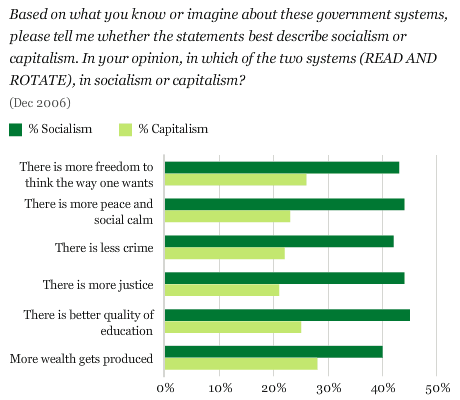GALLUP NEWS SERVICE
WASHINGTON, D.C. -- Venezuela's President Hugo Chavez this week announced Venezuelans will be limited on the amount of luxury goods they can import, citing his countrymen's consumption of foreign whiskey as an example of consumerism's ill effects on society. In 2006, according to the BBC, Venezuelans drank nearly four bottles of Scotch whisky per person, and about 10% of British exports of the spirit. Chavez says the high consumption is embarrassing, and will limit the dollars available to importers.
Chavez's efforts at curbing consumption of high-end items are just one example of what he calls "21 st-century socialism," a populist brand of governance based more on socialist principles than on capitalist ones. Since his re-election last year, Chavez has also worked toward nationalizing key industries, establishing worker-led business firms, and changing Venezuela's constitution and education system. A Gallup Poll conducted at the time of Chavez's re-election reveals Venezuelans tend to perceive socialism more positively than capitalism on key issues affecting day-to-day life, governance, and economics.
On many issues affecting day-to-day life, Venezuelans are nearly twice as likely to associate socialism with positive outcomes, as they are to associate them with capitalism. When Gallup asked respondents whether "more freedom to think the way one wants" better describes socialism or capitalism, 43% say socialism, compared with 26% who say capitalism. Venezuelans share similar views about under which system there is more peace and social calm (44% for socialism vs. 23% for capitalism), and under which system there is less crime (42% for socialism vs. 22% for capitalism).

A similar pattern emerges on issues related to governance. Forty-three percent of Venezuelans say the country has more sovereignty under socialism, while 24% say this is true of capitalism. The same holds true on the issue of corruption, with 42% saying corruption gets fought under socialism, while 21% say this happens with capitalism. Forty-four percent perceive more justice for people under socialism, compared with 21% who perceive this about capitalism.
Forty-nine percent of respondents say socialism offers education opportunities for all, compared with 21% who say the same about capitalism. Venezuelans also perceive that there is better quality of education with socialism (45%) than with capitalism (25%). Nonetheless, when Chavez initially talked about education reform during his first term, several thousand parents and teachers demonstrated against a decree to allow education officials to fire teachers and administrators who disagree with any changes.
While Chavez is unlikely to face great opposition from his support base -- generally the poor -- for his limit on the importation of luxury items, other reform attempts have not fared as well. His attempt, for example, to change the country's constitution to extend the presidency from six to seven years and eliminate presidential term limits has not been well-received as of late. The Venezuelan Assembly is discussing that proposal, and this week a group of legislators from Podemos, a splinter group of a pro-Chavez socialist organization, rejected the constitutional changes, saying they want socialism that is democratic, not authoritarian. Thirty-nine percent of Venezuelans surveyed at the time of Chavez's re-election said that under socialism "it is guaranteed that a president will be changed at the time they have to," while 26% said the same about capitalism.
Venezuelans are more mixed in regard to which system is better from an economic perspective. Forty percent say more wealth gets produced under socialism, compared with 28% who say the same about capitalism. Forty-six percent say wealth is better distributed under socialism and 22% say under capitalism. Venezuelans are nearly evenly divided about which system affords more people with opportunities to make money; 35% say socialism and 34% say capitalism. Roughly 4 in 10 Venezuelans (41%) tell Gallup there is more inflation and a high cost of living under capitalism, compared with 27% who say the same is true about socialism.
Across the board, a high percentage of Venezuelans say they "don't know" about a particular issue, between 17% and 21%, and generally another 5% refuse to answer the question. This may be attributable to the fact the terms socialism and capitalism were not defined for respondents. Some analysts say the high numbers might also reflect a general lack of discourse in the country about these issues, and more a "cult of personality" revolving around Chavez. "Discussions on ideology, such as one would have when one talks about socialism and capitalism and which systems are better, is not something that has been discussed much in Venezuela, and therefore most people really don't think about it too much," says Pedro Bucelli, a financial analyst specializing in emerging markets who is a former board member of Petroleos de Venezuela, the country's national petroleum company, and a pro-business member of the opposition civic group Sumate. "Discussions and debate in Venezuela have focused on individuals," Bucelli adds. "There is a political explosion in the country, revolving around an individual, not necessarily around an ideology."
Survey Methods
Results are based on face-to-face interviews with 1,000 Venezuelan adults, aged 15 and older, in December 2006. For results based on the total sample of national adults, one can say with 95% confidence that the maximum margin of sampling error is ±3 percentage points. In addition to sampling error, question wording and practical difficulties in conducting surveys can introduce error or bias into the findings of public opinion polls.
